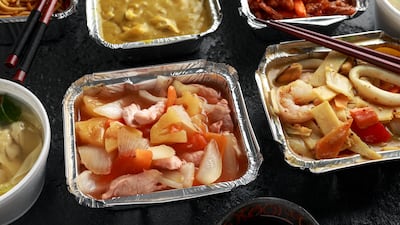Another day, another food furore in the Twitterverse.
This week, it was the turn of British-Chinese cuisine to have social media stones thrown at it by those who live in one of the biggest glasshouses on the planet, in culinary terms: Americans.
The argument started after US Twitter user @daxdives hopped on the platform to declare: “Just found out what the British call Chinese food, at a loss for words,” accompanied by four images of what, in all fairness, can only be described as slop.
But good slop. Yummy slop. The kind of slop you scoop out of aluminium containers and dump on the plate. Aesthetics be darned in favour of deliciousness slop.
Y’know, takeout.
It quickly became apparent that American Twitter took umbrage not only at the inclusion of chips, but also at the lashings of curry sauce with which the dishes were liberally doused.
This being Twitter, @daxdives’s comment immediately sparked a lively and nuanced debate about the integration of immigrant dishes into the foods of existing cultures and …
Just kidding!
It turned into a curry sauce-flinging free-for-all into which the American War of Independence, chicken tikka masala, McDonald’s, American exceptionalism, Scottish deep fried pizza and a discourse on the general state of what those across the Pond call “cheese” were dragged with varying degrees of hostility.
Speaking as a British person, the criticism of one of the rainy isle’s favourite Saturday night traditional takeaways really rubbed curry sauce into the wound.
Homage, not appropriation
Any horrified reaction to the cuisine of a different culture invites a lot to unpack.
To use Chinese takeaways as an analogy: it’s time to take these chicken balls out of the grease-soaked white paper bag and start laying them out on the plate between the chow mein and the sesame prawn toast.
China, as we all know, is huge, encompassing 9.597 million square kilometres of people, provinces and dishes. All of which makes it somewhat ridiculous to lump the nation’s food under the single category of “Chinese food”.
But that’s what we as human beings to be able to make sense of the world. We reduce it, make it smaller, more palatable, like a king prawn in black bean sauce.
British curry, Tex-Mex, Italian-American … cuisines that cross borders have long been adopted and adapted with the countries' names hyphenated to show homage and acknowledgment. To show that, hey, we know this isn’t authentic, but it does contain traces of the original.
It’s an inspiration, like one of those movies that starts off with the caveat "Based on real events". It's a reboot, a reimagining, a spin-off. If Chinese food is Breaking Bad, then British-Chinese food is Better Call Saul.
Chinese immigrants to Britain did what many immigrants do when moving to a new country about 8,000km away and starting a business. They improvised, adapted and evolved. They took elements of their culture and integrated them into those of the nation they moved to.
No one in their right mind was going to waltz into 1950s Britain, pry the tins of Spam out of their still-rationing hands and stick a bowl of congee in it instead. When dealing with such a naturally cautious nation as Britain, introducing “foreign” food had to be done slowly, softly, and with the safety net of things British people knew and were comfortable with.
Like chips.
Also, spoiler alert, the full range of ingredients available in China would most likely not have been found in the UK at the time. So, what did they do? They improvised. And that, curry sauce haters, is called “ingenuity”.
'Fundamental in shaping Britain's food culture'
We must also take into account the differences between Chinese food in the US and Chinese food in the UK.
Namely that the dinky little white cartons with the flimsy metal handles US takeaways come in could only dream of being able to hold, let alone lovingly contain the oozing, slightly spicy, super oily, yellow-brown sludge that is curry sauce.
You wish, white cartons. You wish!
Wading into the Great Curry Sauce Wars, Angela Hui, the British author who wrote the memoir Takeaway: Stories from a childhood behind the counter about her parents’ Chinese restaurant wrote on Twitter: “Whatever your thoughts on takeaways or restaurants, they’ve been fundamental in shaping Britain's food culture. They were the grassroots of many Chinese families including my own who came to this country with nothing. I will fight anyone who thinks chicken balls are bad.”
This latest social media storm is perpetuated by those who like to pretend they don’t understand the Anglicisation (or indeed any -isation) of cross-cultural foods, and so choose to react like a one-year-old faced with a spoonful of pureed broccoli.
Heads up to those people: spaghetti bolognaise isn’t Italian; gyoza did not originate in Japan and French fries are not French.
Are you still at a loss for words?

